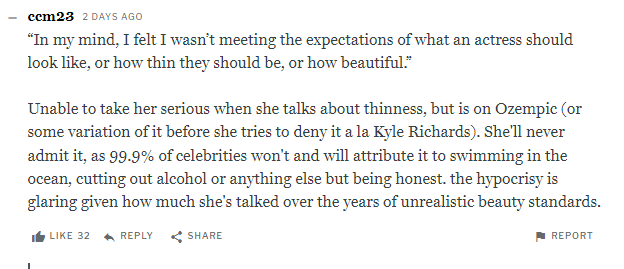This Barbie is fed up with body policing
We've been so harmed by a thinness-obsessed culture that demonizing weight loss seems like a potential corrective. It isn't.
Thanks for reading! This independent newsletter is fueled by likes, shares, and subscriptions, so if you’re into it, here’s how to help me: Click the ❤️ at the bottom so I get more visibility on Substack. Consider going paid for access to all posts (here’s my archive). Share with a friend or on social media. You have my endless gratitude!
I knew what I’d find in the comments on the July 13 cover story for The Cut featuring America Ferrera, one of the stars of “Barbie.” She’s thinner now than she was 20 years ago when she was in “Real Women Have Curves,” so the Ozempic accusers are pissed.
“Still love her, and hope she’s healthy,” says susan21, who remains incredulous even after reading:
… [America] says that “rewiring” herself has been a lifelong process. Therapy helped, as did finally getting relief from an old shoulder injury, a relic of a car accident when she was a teen. Doctors wrote the injury off, prescribing her sleeping pills that she trashed, and by her mid-20s she was “in a debilitating amount of pain.” Then, in her early 30s, she started competing in triathlons, which shifted her relationship with her body from loathing to acceptance and then finally “to gratitude.” She’s completed two. “I had this whole story about being forever in pain and exercise being about fitting into something,” she explains. Training for triathlons — running two hours a day, swimming in the ocean; things she had for a long time thought herself incapable of doing — changed that completely.
We’re living in a baffling cultural moment indeed when a woman can discuss going to therapy, recovering from injury, starting an exercise practice, and finding gratitude for her body and people still concern-troll about her health, because surely her weight loss must be the result of Ozempic — as if that’s the only way any human in history has lost weight.
I beat the ol’ “Ozempic accusers are jerks” drum a lot, not because I’m on Team Weight Loss drugs (nor do I lambast them, as I wrote about here), but because I find it utterly insane that people think they know without a shadow of a doubt that everyone is on Ozempic, and because I find body policing hopelessly misguided.
Many of us have been harmed so deeply by other people policing our bodies, being obsessed with our bodies and their fluctuations, refusing to believe they could be healthy at various sizes, and yet here we are, doing the exact same thing. Hurt people hurt people.
What’s especially nuts to me is that these accusers seem to think that a person losing weight is somehow antithetical to body acceptance but them playing Body Cop is not. If we are going to uphold body acceptance as non-negotiable, which we should, we have to accept that some people will choose to change their bodies, or their bodies will change because they made lifestyle changes that had that effect.
I don’t know America’s life or story, but I do know the experience of realizing you’re capable of exercise and that in fact, you love it. I do know that when you start exercising you might also change how you eat because you feel compelled to treat your body better in general. You might see how exercise sparks the motivation to be healthier than you used to, and these concurrent changes can cause you to lose weight.

I do know that those changes feel really fucking good, and so you keep going. I do know that all this makes you proud and self-actualized and has far less to do with simply losing weight and far more to do with feeling the elation of being good to yourself, grateful for your tenacity, anchored in the stability of your routines, and calmer in your brain.
And then someone might come along and say you’re “cheating” by taking a medicine, or accuse you of worshipping at the altar of thinness, or being a fat-hating bigot, and you feel misunderstood and judged all over again. I see people say things like “You can’t tell someone’s health from looking at them,” and “You don’t know what’s going on with someone’s body,” and “Shut up about people’s bodies,” but refuse extend those dictums to someone who lost weight (or who has always been slender) because they’ve been so harmed by a thinness-obsessed culture that demonizing weight loss seems like a potential corrective.
It isn’t.
I’m far more concerned with how each of us can feel more at peace in a thinness-obsessed culture than I am with bashing my head against the wall trying to change that culture in one fell swoop. Maybe that’s because I’m pessimistic that the culture can change all that much my lifetime, but so be it. The changes that have come are not the result of body policing and accusations, but of more options for engaging with and thinking about bodies, eating, and body image. And so I add another option to that pile:
The only true corrective any of us has access to is to examine our own values and act accordingly. Decide for yourself what feels right for your body, what you want and why you want it, and what feels healthy for you do to, and don’t waste a second of energy on what other people are doing and why.
I know how difficult that is. It can be painful to see someone else do what our culture deems a success when you are a struggling in a body the culture doesn’t accept. I was fat for many years of my life — I well and truly get it.
But I have never realized a moment of peace when I sat around stewing about how some girl lost weight, or how she looks fitter or hotter than me. I have never felt anything but desperately depressed when I’ve wasted my time shouting down what other people are doing as “wrong” instead of spending time doing right by myself.
I still have to beat back jealous and suspicious feelings (though I don’t take to the comments with them, I lay them at the feet of my long-suffering therapist), which I know are driven by insecurity and the wounds to my self-esteem I’ve incurred over the years. But then I try to reflect, pause, think, write it out, and work it out. I try to bring myself back to me, which is all I can do. It’s painful work, and commenting on the internet is easier. It’s also the coward’s way out.
Follow me on Instagram and Tiktok! I just started TT and have no clue what I’m doing! Here I am talking about “Girl Dinner” and the madness of office food talk:











This is really interesting, I don't think we know how to talk about bodies in healthy ways, which should probably lead people to not talk about bodies at all. It appears to be just a way for us to understand our own relationship with our bodies and what is/isn't okay.